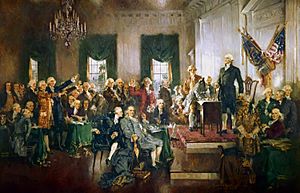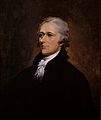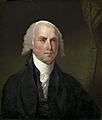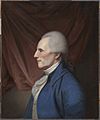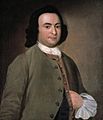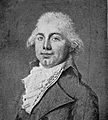Founding Fathers of the United States facts for kids
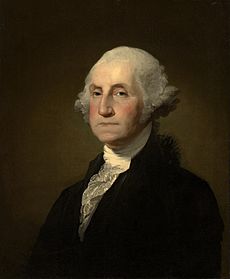
The Founding Fathers refers to certain men who lived during the American Revolutionary War era. These men signed the Declaration of Independence, helped write the Constitution of the United States, or helped win the American Revolutionary War. Many of these men were members of the Continental Congress at some point. The term was first applied to these people in 1916.
There were many people who were Founding Fathers. Some scholars like to limit them to a small number, such as seven: George Washington, John Adams, Thomas Jefferson, Benjamin Franklin, Alexander Hamilton, John Jay, and James Madison.
Most of the Founding Fathers were large landowners or rich merchants. The majority owned slaves. After the Constitution, many of the Founding Fathers became leaders in the federal government.
Contents
Background
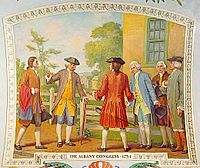
The First Continental Congress met briefly in Philadelphia, Pennsylvania in 1774 and consisted of fifty-six delegates from twelve of the Thirteen Colonies that would become the United States of America. The delegates, who included George Washington, soon to command the army, Patrick Henry, and John Adams, were elected by their respective colonial assemblies. Other notable delegates included Samuel Adams from Massachusetts, John Dickinson from Pennsylvania and New York's John Jay. This congress in addition to formulating appeals to the British crown, established the Continental Association to administer boycott actions against Britain. When the Second Continental Congress came together on May 10, 1775, it was, in effect, a reconvening of the First Congress. Many of the same 56 delegates who attended the first meeting participated in the second. Notable new arrivals included Benjamin Franklin and Robert Morris of Pennsylvania, John Hancock of Massachusetts, and John Witherspoon of New Jersey. Hancock was elected Congress President two weeks into the session when Peyton Randolph was summoned back to Virginia to preside over the House of Burgesses. Thomas Jefferson replaced Randolph in the Virginia congressional delegation. The second Congress adopted the Declaration of Independence. Witherspoon was the only active clergyman to sign the Declaration. He also signed the Articles of Confederation and attended the New Jersey (1787) convention that ratified the Federal Constitution.
The newly founded country of the United States had to create a new government to replace the British Parliament. The Americans adopted the Articles of Confederation, a declaration that established a national government which was made up of a one-house legislature. Its ratification by all thirteen colonies gave the second Congress a new name: the Congress of the Confederation, which met from 1781 to 1789. Later, the Constitutional Convention took place during the summer of 1787, in Philadelphia. Although the Convention was called to revise the Articles of Confederation, the intention from the outset of many–chief among them James Madison and Alexander Hamilton–was to create a new frame of government rather than to fix the existing one. The delegates elected George Washington to preside over the Convention. The result of the Convention was the United States Constitution.
Collective biography of the Framers of the Constitution
In the winter and spring of 1786–1787, twelve of the thirteen states chose a total of 74 delegates to attend what is now known as the Federal Convention in Philadelphia. Nineteen delegates chose not to accept election or attend the debates; for example, Patrick Henry of Virginia thought that state politics were far more interesting and important than national politics, though during the ratification controversy of 1787–1788 he claimed, "I smelled a rat." Rhode Island did not send delegates because of its politicians' suspicions of the Convention delegates' motivations. As a sanctuary for Baptists, Rhode Island's absence at the Convention in part explains the absence of Baptist affiliation among those who did attend. Of the 55 who did attend at some point, no more than 38 delegates showed up at one time.
These delegates represented a cross-section of 18th-century American leadership. Almost all of them were well-educated men of means who were leaders in their communities. Many were also prominent in national affairs. Virtually every one had taken part in the American Revolution; at least 29 had served in the Continental Army, most of them in positions of command. Several of the latter were instrumental in establishing the Society of the Cincinnati in 1783. Scholars have examined the collective biography of them as well as the signers of the Declaration and the Constitution.
Political experience
The Framers of the Constitution had extensive political experience. By 1787, four-fifths (41 individuals), were or had been members of the Continental Congress. Nearly all of the 55 delegates had experience in colonial and state government, and the majority had held county and local offices.
- Thomas Mifflin and Nathaniel Gorham had served as President of the Continental Congress.
- The ones who lacked congressional experience were Bassett, Blair, Brearly, Broom, Davie, Dayton, Alexander Martin, Luther Martin, Mason, McClurg, Paterson, Charles Pinckney, Strong, Washington and Yates.
- Eight men (Clymer, Franklin, Gerry, Robert Morris, Read, Roger Sherman, Wilson, and Wythe) had signed the Declaration of Independence.
- Six (Carroll, Dickinson, Gerry, Gouverneur Morris, Robert Morris, and Roger Sherman) had signed the Articles of Confederation.
- Two, Sherman and Robert Morris, signed all three of the nation's basic documents.
- Dickinson, Franklin, Langdon, and Rutledge had been governors.
Occupations and finances
The 1787 delegates practiced a wide range of high and middle-status occupations, and many pursued more than one career simultaneously. They did not differ dramatically from the Loyalists, except they were generally younger and less senior in their professions.
- Thirty-five had legal training, though not all of them practiced law. Some had also been local judges.
- At the time of the convention, 13 men were merchants: Blount, Broom, Clymer, Dayton, Fitzsimons, Shields, Gilman, Gorham, Langdon, Robert Morris, Pierce, Sherman, and Wilson.
- Seven were major land speculators: Blount, Dayton, Fitzsimmons, Gorham, Robert Morris, Washington, and Wilson.
- Eleven speculated in securities on a large scale: Bedford, Blair, Clymer, Dayton, Fitzsimons, Franklin, King, Langdon, Robert Morris, Charles Cotesworth Pinckney, and Sherman.
- Fourteen owned or managed slave-operated plantations or large farms: Bassett, Blair, Blount, Johnson, Butler, Carroll, Jenifer, Jefferson, Madison, Mason, Charles Pinckney, Charles Cotesworth Pinckney, Rutledge, Spaight, and Washington.
- Many wealthy Northerners owned domestic slaves: Franklin later freed his slaves and was a key founder of the Pennsylvania Abolition Society. Jay founded the New York Manumission Society in 1785, for which Hamilton became an officer. They and other members of the Society founded the African Free School in New York City, to educate the children of free blacks and slaves. When Jay was governor of New York in 1798, he signed into law a gradual abolition law; fully ending slavery as of 1827. He freed his own slaves in 1798.
- Broom and Few were small farmers.
- Eight of the men received a substantial part of their income from public office: Baldwin, Blair, Brearly, Gilman, Livingston, Madison, and Rutledge.
- Three had retired from active economic endeavors: Franklin, McHenry, and Mifflin.
- Franklin and Williamson were scientists, in addition to their other activities.
- McClurg, McHenry, Rush, and Williamson were physicians, and Johnson was a college president.
Family and finances
A few of the 1787 delegates were wealthy, but many of the country's top wealth-holders were Loyalists who went to Britain. Most of the others had financial resources that ranged from good to excellent, but there are other founders who were less than wealthy. On the whole they were less wealthy than the Loyalists.
Demographics
Brown (1976) and Harris (1969) provide detailed demographic information on each man.
- Most of the 1787 delegates were natives of the Thirteen Colonies. Only nine were born elsewhere: four (Butler, Fitzsimons, McHenry, and Paterson) in Ireland, two (Davie and Robert Morris) in England, two (Wilson and Witherspoon) in Scotland, and one (Hamilton) in the West Indies.
- Many of them had moved from one state to another. Seventeen individuals had already lived, studied or worked in more than one state or colony: Baldwin, Bassett, Bedford, Dickinson, Few, Franklin, Ingersoll, Hamilton , Livingston, Alexander Martin, Luther Martin, Mercer, Gouverneur Morris, Robert Morris, Read, Sherman, and Williamson.
- Several others had studied or traveled abroad.
The Founding Fathers had strong educational backgrounds at the colonial colleges or abroad. Some, like Franklin and Washington, were largely self-taught or learned through apprenticeship. Others had obtained instruction from private tutors or at academies. About half of the men had attended or graduated from college. Some men held medical degrees or advanced training in theology. Most of the education was in the colonies, but several were lawyers who had been trained at the Inns of Court in London.
Framers and signers of founding documents
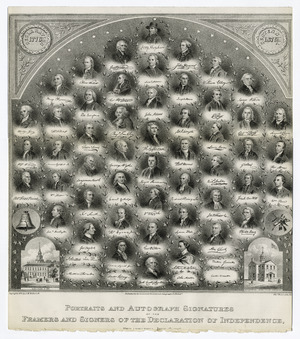
The National Archives has identified three founding documents as the "Charters of Freedom": Declaration of Independence, United States Constitution, and Bill of Rights. According to the Archives, these documents "have secured the rights of the American people for more than two and a quarter centuries and are considered instrumental to the founding and philosophy of the United States." In addition, the Articles of Confederation has also gained general acceptance as a founding document.
As a result, signers of the following documents are widely considered Founding Fathers of the United States: Declaration of Independence (DI), Articles of Confederation (AC), and U.S. Constitution (USC). The following table provides a list of these founders, some of whom signed more than one document.
Notes:
Delegates who did not sign the U.S. Constitution
In addition to recognizing 39 signers of the U.S. Constitution, some sources also consider those who helped write the document but did not sign it to be founders. The following list includes the 16 framers who participated in the Constitutional Convention but for one reason or another did not sign the document presented to the Confederation Congress for adoption by the states:
|
|
Additional founders
In addition to the signers of the founding documents and the seven "greats" previously mentioned - Adams, Franklin, Hamilton, John Jay, Jefferson, Madison and Washington - the following are regarded as founders based on their contributions to the birth and early development of the new nation:
- George Clinton, first governor of New York, 1777—1795, and fourth vice president of the U.S., 1805—1812.
- Patrick Henry, gifted orator; first and sixth governor of Virginia, 1776—1779 and 1784—1786.
- Robert R. Livingston, member of the Committee of Five that drafted the Declaration of Independence, 1776; first U.S. Secretary of Foreign Affairs, 1781—1783, and first Chancellor of New York, 1777—1801.
- John Marshall, fourth chief justice of the U.S. Supreme Court, 1801—1835.
- James Monroe, fifth president of the United States, 1817—1825.
- Peyton Randolph, Virginia delegate to the First Continental Congress, where he served as the Congress's first president.
- Charles Thomson, secretary of the Continental Congress, 1774—1789.
- Thomas Paine, author of influential pamphlets in the 1770s; sometimes referred to as "Father of the American Revolution".
Images for kids
-
Declaration of Independence, an 1819 painting by John Trumbull, depicts the Committee of Five (John Adams, Thomas Jefferson, Benjamin Franklin, Roger Sherman, and Robert Livingston) presenting their draft to the Second Continental Congress on June 28, 1776.
-
Signature page of the Treaty of Paris of 1783 that was negotiated on behalf of the United States by John Adams, Benjamin Franklin, and John Jay
-
Benjamin Franklin, an early advocate of colonial unity, was a foundational figure in defining the US ethos and exemplifying the emerging nation's ideals.
-
Robert R. Livingston, member of the Committee of Five that drafted the Declaration of Independence.
-
Alexander Hamilton served as Washington's senior aide-de-camp during most of the Revolutionary War; wrote 51 of the 85 articles comprising the Federalist Papers; and created much of the administrative framework of the government.
-
John Jay was president of the Continental Congress from 1778 to 1779, negotiated the Treaty of Paris with Adams and Franklin, and wrote The Federalist Papers with Hamilton and Madison.
-
James Madison, called the "Father of the Constitution" by his contemporaries
-
Peyton Randolph, as president of the Continental Congress, presided over creation of the Continental Association.
-
Richard Henry Lee, who introduced the Lee Resolution in the Second Continental Congress calling for the colonies' independence from Great Britain
-
John Hancock, president of the Continental Congress, renowned for his large and stylish signature on the United States Declaration of Independence
-
John Dickinson, known as the "Penman of the Revolution", among other accomplishments wrote the 1774 Petition to the King, the 1775 Olive Branch Petition, the final draft of Causes and Necessity of Taking Up Arms, and the first draft of the Articles of Confederation.
-
Henry Laurens was president of the Continental Congress (November 1, 1777 - December 9, 1778) when the Articles were passed on November 15, 1777.
-
Roger Sherman, member of the Committee of Five, signed Olive Branch Petition in 1775; the only person who signed all four major U.S. founding documents.
-
Robert Morris, president of Pennsylvania's Committee of Safety, "Financier of the Revolution", and one of the founders of the financial system of the United States.
-
George Washington and his valet slave William Lee, by John Trumbull, 1780
-
Abigail Adams, close advisor to her husband John Adams
-
George Mason, author of the 1776 Virginia Declaration of Rights and co-father of the United States Bill of Rights
-
James Monroe served as delegate from Virginia in 1783-1786.
See also
 In Spanish: Padres fundadores de los Estados Unidos para niños
In Spanish: Padres fundadores de los Estados Unidos para niños


